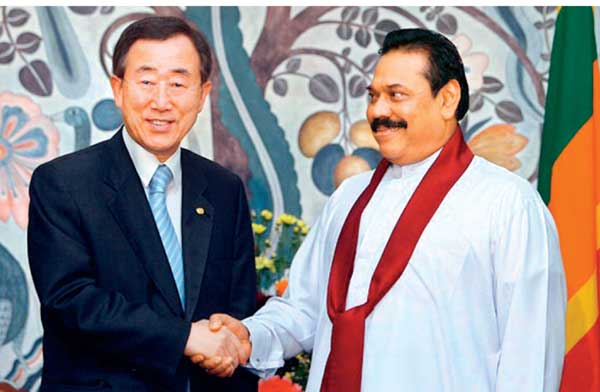Reply To:
Name - Reply Comment
Last Updated : 2024-04-26 02:12:00

 The remark that is said to have been once made by the leader of the Liberation Tigers of Tamil Eelam (LTTE) Velupillai Prabhakaran about the Sinhalese forgetting anything in two weeks has since been popular and oft quoted, especially by the Sinhalese themselves, when they resort to criticise their fellow men for political forgetfulness. But it is not a malady confined only to Sinhalese; rather a universal phenomenon.
The remark that is said to have been once made by the leader of the Liberation Tigers of Tamil Eelam (LTTE) Velupillai Prabhakaran about the Sinhalese forgetting anything in two weeks has since been popular and oft quoted, especially by the Sinhalese themselves, when they resort to criticise their fellow men for political forgetfulness. But it is not a malady confined only to Sinhalese; rather a universal phenomenon.
For instance Tamils who voted against Mahinda Rajapaksa en masse at the 2010 Presidential election mainly for hurting their pride during the war readily voted at the same election for General Sarath Fonseka, the Army Commander who spearheaded the war against the LTTE who was considered by many Tamils as the pride of
their community.
This happened just seven months after the decimation of the LTTE leadership by the armed forces.
Loyalists of the former President Mahinda Rajapaksa, who prefer to be called “Joint Opposition” also have forgotten their administration that ended just 18 months ago and make various claims that invariably boomerangs.
The latest of the kind is the letter they had handed over to the Secretary General of the United Nations, Ban Ki-moon during his visit to the country last week. The letter had called on the UN chief not to meddle in the internal matters of the country.
Theoretically they were correct. In theory all countries in the world, whether they are rich or poor, Western or Eastern, big or small should be treated equally. No country or organisation has the right to meddle in the affairs of other countries, otherwise the world decides collectively.
However, the reality in most cases is different.
The US congress or the British Parliament takes up human rights situation in any country and sometimes those Western powers would take punitive measures against those countries. Furthermore the Western powers are very selective in taking action against human rights violators. But it would be an utter wastage of time if India’s Lok Sabha, leave alone Sri Lankan Parliament, discussed the water boarding in the US or unceasing bulldozing of Palestinian houses by the Israeli forces.
However, what the Joint Opposition has forgotten or pretending to have forgotten or thinks that the people have forgotten is that their administration also not only tolerated all the meddling by the UN and the Western forces but also cooperated with those powers. And also they had sometimes intentionally invited meddling by the United Nations since the regime in power then had been ruthlessly violating human rights of the people.
Ban Ki-moon last visited Sri Lanka seven years ago, in May 2009, days after the end of the war between the armed forces and
the LTTE.
At the end of his visit the then President Mahinda Rajapaksa and the UN Secretary General had issued a joint communiqué by which Sri Lankan government, under Rajapaksa, had undertaken to investigate into the human rights violations possibly committed by both the belligerent parties during the last lap of the war.
The stance of the then government on the human rights violations in the country, especially in the battlefront was that the armed forces followed a “zero casualty policy” in respect of civilians in the war theatres. The communiqué was a clear manifestation of the Rajapaksa government giving in to the pressure or the meddling by the very same UN Secretary General Ban Ki-moon.
The Sri Lankan government under President Rajapaksa had rejected the first three US sponsored resolutions on Sri Lanka adopted by the UNHRC consecutively from 2012 to 2014 on various grounds, ranging from morality to legality which were not totally unfounded, but only to face an ever toughening stance of the international players. The first resolution demanded that Sri Lanka to implement the recommendations of its own Lessons Learnt and Reconciliation Commission (LLRC) which had been used then by the Sri Lankan government leaders to show off its commitment for safeguarding human rights since the LLRC had recommended domestic inquiries into the alleged human rights violations.
Sri Lankan leaders rejected the resolution claiming that it was prejudicial to the sovereignty of the country, but later responded with a National Action Plan incorporating human rights issues and with a six member army court of inquiry to look into certain allegations mentioned in the LLRC report. They also rejected outright the second resolution in 2013 and the third one in 2014 on the same grounds, but again responded with the Presidential Commission investigating cases of Missing Persons. The Missing Persons Commission was interestingly appointed after a strong claim by the then Defence Secretary Gotabaya Rajapaksa and the findings of the court of inquiry appointed by the Army Commander that no person had disappeared during the war.
It goes without saying that the former government of President Rajapaksa would not have appointed these courts and commissions had it totally rejected the international meddling through UNHRC resolutions. It also appointed foreign experts to advice the missing persons commission commonly known as the Paranagama Commission and gave it a second mandate to investigate into the civilian deaths that took place during the war. This was done while it was said that a “zero casualty policy” in respect of civilians
was implemented.
In fairness to Rajapaksa and his ministers as well as his officials it must be recalled that they protested against the pressures and meddling by the UN and the Western powers openly while caving in to them. They told the Western and UN leaders about the selectivity and double-standards followed by the latter with respect to human rights, while submitting to the dictates of those leaders. Hence the letter handed over to the UN Chief by the joint opposition could be taken as a continuation of their stand as well as a measure to embarrass the government which cooperates with the UN leaders without protests.
In spite of the intentions of the Mahinda group in protesting against the meddling by the UN, it is appropriate for somebody in the country to tell Ban that he has no clear picture about the country which was indicated by his controversial comment on Rwanda and Sri Lanka. At a meeting in Colombo he said “Something more terrible, and serious happened in the past.
In 1994, in Rwanda, there was a massacre. More than one million people were massacred. United Nations felt responsible for that…“Of course, it was their war and massacres. But the United Nations was not able to act on it. We said repeatedly, ‘Never again,
never again’.
It happened just one year after in Srebrenica. Again, many people were massacred when they were not fully protected by the United Nations Peacekeeping Operations. So we repeated again, ‘Never again’…“How many times should we repeat never, never again? We did again in Sri Lanka. We have to do much more not to repeat such things in Sri Lanka, Yemen and elsewhere.”
One cannot say for sure that Ban compared the happenings in Rwanda and Srebrenica in Serbia with those took place in Sri Lanka during the war. However, when a person of his stature talks about situations in those three places at a stretch, the picture he paints places Sri Lanka on par with Rwanda, where more than 800,000 Tutsis were killed within a week by Hutus in 1994 and Srebrenica in Bosnia where more than 200,000 ethnic Muslims were killed, while more than 50,000 women were raped by the Serbs in the following years. Hence, the letter handed over to the UN Chief by the leaders of the Joint Opposition could be considered as a step in the right direction. However, on the other hand it might also be considered to be ridiculous for them to write such a letter after submitting to all pressures during their regime. Therefore it represents the moral dilemma of the group with regard to foreign interferences. The simple truth is that governments of countries like Sri Lanka have to obey the orders of the powerful countries, irrespective of what party is at the helm in
those countries.

Add comment
Comments will be edited (grammar, spelling and slang) and authorized at the discretion of Daily Mirror online. The website also has the right not to publish selected comments.
Reply To:
Name - Reply Comment
US authorities are currently reviewing the manifest of every cargo aboard MV
On March 26, a couple arriving from Thailand was arrested with 88 live animal
According to villagers from Naula-Moragolla out of 105 families 80 can afford
Is the situation in Sri Lanka so grim that locals harbour hope that they coul